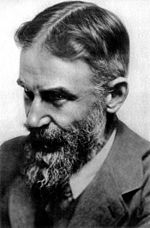Portal:Ireland/Selected biography archive/23
George Bernard Shaw (26 July 1856 – 2 November 1950) was an Irish playwright.
Although Shaw's first profitable writing was music and literary criticism, his talent was for drama, and he authored more than 60 plays including Pygmalion. Nearly all of his writings deal sternly with prevailing social problems, but have a vein of comedy to make their stark themes more palatable. Shaw examined education, marriage, religion, government, health care, and class privilege and found them all defective. He was most angered by the exploitation of the working class, and most of his writings censure that abuse. An ardent socialist, Shaw wrote many brochures and speeches for the Fabian Society. He became an accomplished orator in the furtherance of its causes, which included gaining equal political rights for men and women, alleviating abuses of the working class, rescinding private ownership of productive land, and promoting healthful lifestyles.
Shaw married Charlotte Payne-Townshend, a fellow Fabian, whom he survived. They settled in Ayot St. Lawrence in a house now called Shaw's Corner. Shaw died there, aged 94, from chronic problems exacerbated by injuries he incurred by falling.
He is the only person to have been awarded both the Nobel Prize for Literature (1925) and an Oscar (1938). These were for his contributions to literature and for his work on the film Pygmalion, respectively. Shaw wanted to refuse his Nobel Prize outright because he had no desire for public honors, but accepted it at his wife's behest: she considered it a tribute to Ireland. He rejected the monetary award, requesting it be used to finance translation of Swedish books to English. Read more...

